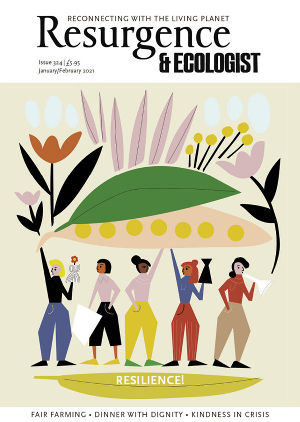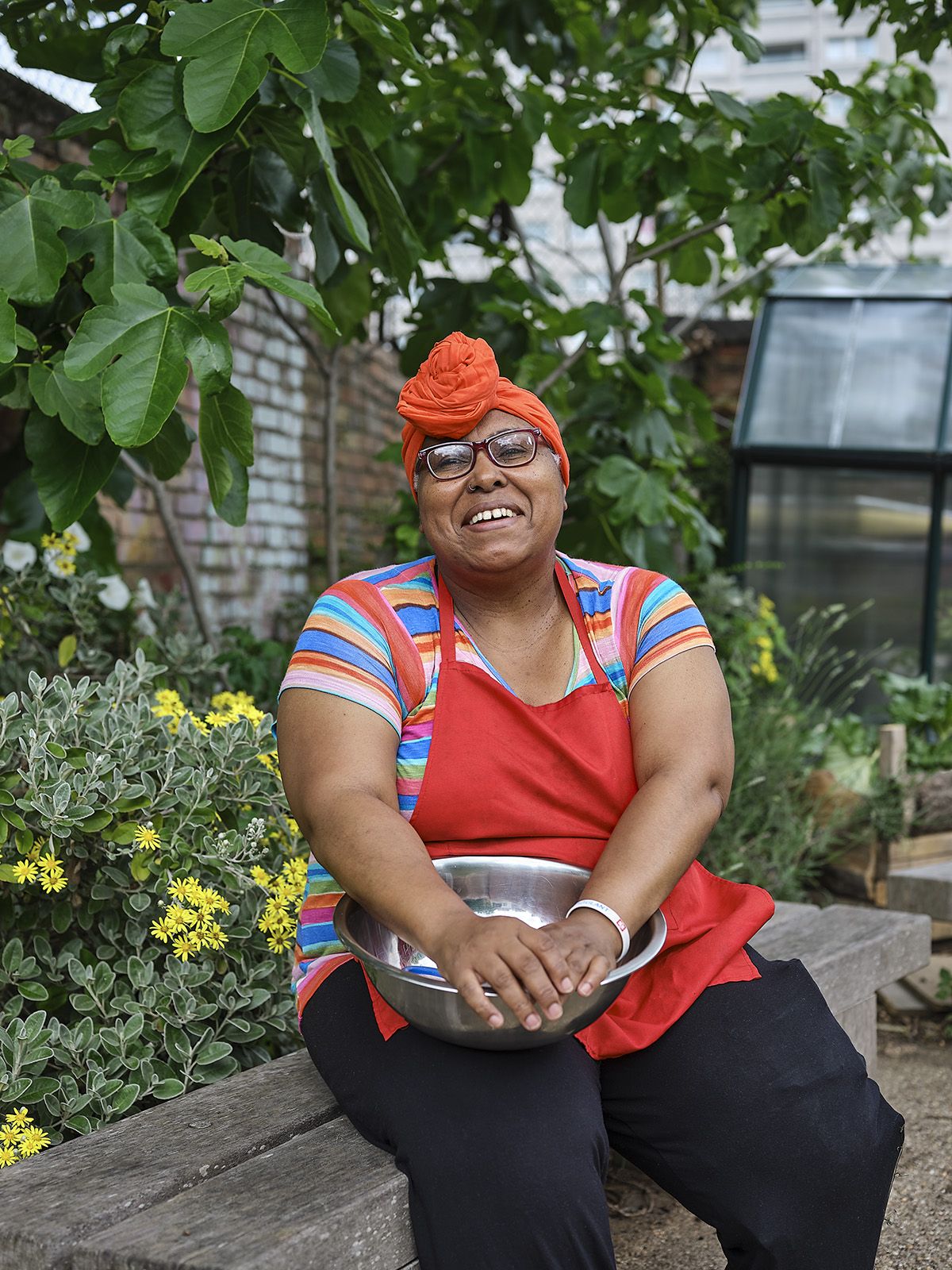Granville Community Kitchen is a community hub that organises food-centred activities for residents in South Kilburn, an area in north-west London once known for its high levels of crime and poor housing. Since 2014, the kitchen has grown from serving around 50 families to over 200, and has built a safe space for the most disaffected to raise their voices to advocate for structural change at local, national and international level.
Can you tell us about Granville Community Kitchen, how it started and how it has grown over the years?
There were a variety of reasons it came about. One, we had a community garden, which we started in 2012, and we wanted to teach children and young people how to cook. And two, we were observing people in the community who couldn’t access food. At the same time I was affected by a disability benefits decision and found myself with very little money to live on. I thought: I’m not going to a food bank. We have so many skills, so much knowledge in this community that I’m sure we could do something to support each other. The kitchen started from that.
How have your activities been affected by the Covid-19 pandemic?
We’re doing food aid serving 200 families, with a reach of 800 people a week. Within that we’ve also started the Good Food Box veg box scheme. It seems important to be shifting from food aid as a model to be able to feed people. People should be able to have an option to afford to feed themselves. So we started a solidarity organic veg box scheme and that’s picking up. The aim of that is to support people with low incomes. Our smallest bag is £3.10, the equivalent of a Healthy Start voucher, with a solidarity price so that people pay more if they can afford to. In that way they are supporting both the farmer and people in the community. This is true mutual aid.
Our garden is still open, and we make ourselves available to people for a little chat when we deliver food parcels. We went over and sang ‘Happy Birthday’ to one of the elders the other day. We give flowers to people, little things to boost their spirits during this time, because people are really suffering – young people and elders – we just try to bring some cheer where we can.
How do you source the veg boxes?
We work with the Landworkers’ Alliance and Better Food Traders for most of our vegetables. We also work with the African and Caribbean Food Heritage Network to source food from West Africa that will meet the cultural needs of African, Caribbean and South American people in the area. There aren’t any local shops that cater to these needs now. There is a Marks & Spencer in Queen’s Park, and more recently one of these independent supermarket chains that carry, in my opinion, non-food. That’s because of gentrification.
American food justice activist Karen Washington uses the phrase ‘food apartheid’ instead of ‘food desert’ or ‘food swamp’ to talk about limited access to affordable and nutritious food in a particular area. What do you think about this term?
If you think about it, deserts and swamps are more or less natural occurrences. That’s not true in an urban or rural setting. In a lot of underserved areas in the UK you don’t get any real markets or real shops offering good food. It might be one corner shop and a proliferation of chicken shops. These same neighbourhoods have poor housing, high instances of food insecurity and obesity. It’s down to planning. Somewhere someone or several people made deliberate decisions about this. This is an example of how systemic inequalities are perpetuated.
The website of Granville Community Kitchen says: “We see the kitchen as a place of repair, resilience, resistance and safety.” What does resilience mean to you, and can you achieve it without repair and resistance?
South Kilburn has a strong community spirit. I think with everything that has been thrown at us, we remain open, we remain hopeful and we’re always building, always co-creating. People really believe that this is somewhere they belong, and to me that is resilience.
The repair part is really key. We use food as one way of doing that but it is about creating those bonds, about having people who believe in each other. I’ve seen people who are homeless come in and be accepted – it’s one place you are accepted. You have healing, and you have one place that accepts you no matter what. That you can come and make a new friend and have a hot meal, that changes so much for so many people. You can get support if you need support to find somewhere to live or deal with your benefits or just find someone to talk to. Having that caring ecology is resilience.
People talk about sustainability. They look at the environment, but they don’t focus so much on the people aspect of it. In terms of resistance, it’s just having that agency to know that you can change things. In 2016 when they said they were tearing down our building, as a community we fought back. We didn’t have a clue how to do that, but we did it.
That was when you found out Brent council planned to redevelop the Granville building for housing. Can you tell us more about that?
We had to do a really visible and high-pressure campaign. We got the writer Zadie Smith, whose mum used to work at the building, to speak at an event. That was the same year I won BBC Cook of the Year. We just had this incredible support, so they backed down, but since then they have gone ahead [with the plans to develop the site]. They haven’t asked “Do you want housing on the site?” The community has come out over and over again and given evidence about why housing is not suitable on that site. We have an issue nationally and especially in London with lack of access to truly affordable housing. We are not against that. Build it elsewhere. What we’re saying is we need a large community space for an increase in the housing density and people. It already exists and is deeply embedded in the memories and culture of South Kilburn. It is a home away from home. Because of the pandemic the plan is being pushed back by at least a year.
You’ve said you teach people to cook in a way that “sparks joy and curiosity to experience flavour and texture and smell and colour”. How do you do that, and why is it important?
I think it’s important to learn from each other, to share our food cultures, to create new memories, especially if you’re impoverished and you’re distanced from your family or country of origin and you’re eating rubbish food. I think that just saps the joy from you. Learning to cook in a way that’s playful and experimental and isn’t about having a pretty plate or trying to emulate what’s on Instagram, but learning to cook food that your grandmother or your mother cooked for you. That’s what I do. I’m in a kitchen with young people and children, and we make mistakes and we have fun. If we’re doing something with chocolate, we’re all covered in chocolate. It isn’t about everyone having their own little station: it’s about learning how to share. If you know something that others don’t, you share those skills. I had a young person teach me the chef way to cut tomatoes. I’m always open to learning, and because we’re in such a diverse area I try to reflect that in the food we’re cooking. We always have someone in the kitchen from somewhere else. I’m always learning and I’m always passing that on.
What’s your favourite meal?
My favourite meal is a First Peoples’ meal called Pepperpot, not to be confused with any other Pepperpot from the Caribbean. It connects me to my own First Peoples heritage. It’s a stew made from wild-caught meat. I use venison, pheasant, rabbit, duck and wild-reared beef. It is cooked in an earthenware pot with Cassareep, a special sauce made from manioc/cassava boiled down until it’s black, to preserve the food, and I add chili and spices. No garlic, no onions. It’s a very simple dish. It tastes better the longer you keep it. You reheat it everyday and add fresh meat. There are stories of a pot lasting for years. It’s an amazing meal. I’ve done it for a workshop with an organisation in the city and served it with traditional cassava bread. People were licking the container. It was one of those food experiences you wouldn’t normally get here.
To support the campaign to protect the Granville building, visit www.forusbyus.org
www.granvillecommunitykitchen.org.uk







